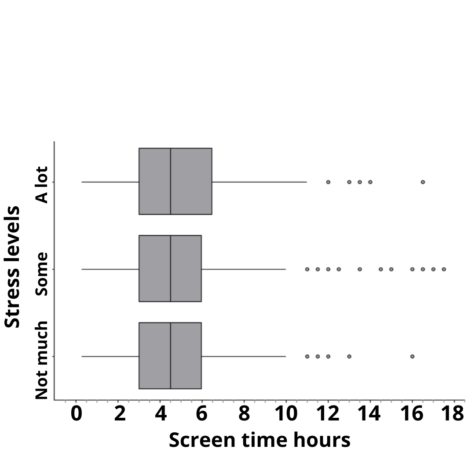Is screen time affecting students’ performance at school?
December 14, 2021
There is no correlation between the students’ screen time use and their GPA. The smartphone has become such a big part of students’ life that their grades are not affected by it. Students with a higher GPA have screen time ranging from zero to eight hours, as well as those with a lower GPA.

Stress levels and screen time
Mr. Benson’s statistics class found no correlation between stress levels and screen time, meaning that phone usage is not an issue in terms of stress. While students have higher stress levels it is not rooted in phone use as much as school work, keeping up with responsibilities, deadlines and social life balance.
Is higher screen time a problem? What is it affecting if it’s not affecting grades and stress levels?
Sleep is the main thing being affected by phone use. Staying up watching videos and being on social media is leading to poor sleep habits along with less energy throughout the day, as well as higher distraction. Screen time is affecting the way students hold relationships since valuable time is being spent on their phones instead of building relationships with the people around them. Phone use and social media makes students anxious since they have to see what is going on and what their friends are doing. Once students get in the habit of always checking their phone–even when it is away–it is still affecting the way they are thinking and it is affecting the way they process things. This takes away from their attention span and the ability to focus on something for a significant amount of time.
How is this affecting teaching?
At the beginning of the COVID-19 pandemic, students were told that electronic devices would become their greatest resources through online learning. After almost two years since it started a lot has changed, screens are incorporated into most in-person classes. Phones are a great resource in the classroom, but they should not be the center of attention. While he does not believe phones are a great companion, Mr. Fish believes they are an amazing resource. He said, “I think smartphones can be a useful tool and I like to see kids looking up words.” Most students will maintain a balance at school with their screen time, putting it away when teachers are lecturing and taking it out during their work time. Mr. Fish said, “There’s often a big difference between escape and exploration. If you’re exploring things and they’re useful things that’s great, if you’re just escaping I think we’re doing enough of that already.”
How can students manage their screen time?
The biggest factor in reducing daily screen time is self-control. While setting limits on apps is an amazing strategy, all limits can be taken off. A great way for students to reduce screen time is by turning off their phone for 30 minutes a day. This time can be used to read, take a walk, focus on schoolwork or spend time with family and friends.
One of the features provided on smartphones is putting limits on apps, after the time has passed a screen comes up with a notification and the user has two options, to ignore the limit for the day, or to remind them again in 15 minutes.
Students can clear out their phone of apps that are not worth their time, this is another way to reduce screen time, especially if they are not providing positive messages. Taking steps into reducing screen time is no easy thing to do as it is so engraved into everyone’s daily lives, but anything counts. It will take a lot of self-will but it will lead to a healthier and happier life.
